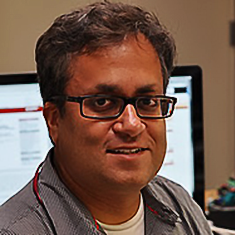
Vineet N. KewalRamani, Ph.D.
- Center for Cancer Research
- National Cancer Institute
- Building 535, Room 108C
- Frederick, MD 21702-1201
- 301-846-1249
- vineet.kewalramani@nih.gov
RESEARCH SUMMARY
Dr. KewalRamani made significant advances in illuminating the role of host factors in HIV infection and the biology of HIV in animal models. Under his direction, the Model Development Section (MDS) examined virus-host interactions at molecular, cellular, and animal levels to better understand HIV immunopathogenesis and the development of antiviral resistance.
Areas of Expertise

Vineet N. KewalRamani, Ph.D.
Research
Examination of Virus-Host Interactions at Molecular, Cellular, and Animal Levels to Better Understand HIV Immunopathogenesis and the Development of Antiviral Resistance
The Model Development Section (MDS) sought to further basic science understanding of HIV-1 replication, cell biology, and immunology as well as translate basic research findings to develop model systems that more faithfully mimic human immunodeficiency virus (HIV) infection in vivo. Projects in the MDS included: (1) Understanding how HIV-1 exploits cell biological mechanisms to further virus replication. (2) Identification of innate intracellular mechanisms that counteract HIV-1 replication. (3) The development of improved nonhuman primate models to study HIV-1 pathogenesis and persistence.
Publications
HIV-1-induced AIDS in monkeys
Derivation of simian tropic HIV-1 infectious clone reveals virus adaptation to a new host
A single gp120 residue can affect HIV-1 tropism in macaques
STRUCTURAL VIROLOGY. X-ray crystal structures of native HIV-1 capsid protein reveal conformational variability
Selection of unadapted, pathogenic SHIVs encoding newly transmitted HIV-1 envelope proteins
Biography

Vineet N. KewalRamani, Ph.D.
Dr. Vineet N. KewalRamani first developed an interest in retroviruses as an undergraduate in the University of Wisconsin at Madison. After choosing to pursue molecular biology as a career, he enrolled in the graduate program at the University of Washington in Seattle where he studied HIV molecular replication at the Fred Hutchinson Cancer Research Center. Upon completing his Ph.D. training in 1996, he received a fellowship from the Damon Runyon Cancer Research Foundation and a postdoctoral position from New York University where he examined HIV infection within an immunological context. While working in NYU, he joined in an effort to develop a mouse model for HIV replication using transgenic technologies. These studies provided the foundation for his group's current work at the National Cancer Institute. Today, his team investigates the role of host factors in HIV infection and the biology of HIV in animal models. HIV and other retroviruses hack the host organism's genetic program to propagate their code. They also rapidly evolve in the face of selective pressure. By illuminating how retroviruses co-opt host functions while evading antiviral drugs or immune responses, his lab seeks to develop new strategies to impede the dynamic viral program. Dr. KewalRamani was the 2011 and 2012 chair of the National Institutes of Health (NIH) Earl Stadtman Virology Search Committee and a co-organizer of the Cold Spring Harbor Laboratory 37th annual meeting on Retroviruses held in May of 2012. He is a past chair of the NIH Norman Salzman Virology Scientific Committee. He has served on the editorial boards of Journal of Virology, PLoS ONE, Retrovirology, and Virology. He was tenured by the NIH in 2010.